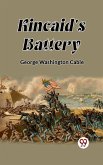In "Kincaid's Battery," George Washington Cable crafts a vivid portrayal of the Civil War, encapsulating the struggles and camaraderie faced by a band of soldiers through the lens of Southern military experience. The narrative is characterized by Cable's lyrical prose and rich character development, which serve to illuminate the broader implications of war on personal identity and community. Set against the backdrop of New Orleans during a tumultuous period, the book deftly interweaves historical details with personal anecdotes, making the reader keenly aware of the socio-political complexities of the time. George Washington Cable, a prominent author and social commentator of the late 19th century, was notably influenced by his Southern upbringing and his staunch advocacy for social reform. Having witnessed the lingering scars of the Civil War in his hometown, Cable's narrative voice is imbued with a sense of urgency to address both the heroism and the inherent tragedy of conflict. His deep-rooted connections to the cultural landscape of Louisiana infuse the work with authenticity and depth. "Kincaid's Battery" is a compelling read for those interested in American literature, Civil War history, or the intricacies of human relationships amid adversity. Cable's evocative storytelling invites readers to immerse themselves in a world marked by bravery, loss, and redemption, making it a crucial addition to any literary collection.
Dieser Download kann aus rechtlichen Gründen nur mit Rechnungsadresse in A, B, BG, CY, CZ, D, DK, EW, E, FIN, F, GR, H, IRL, I, LT, L, LR, M, NL, PL, P, R, S, SLO, SK ausgeliefert werden.









